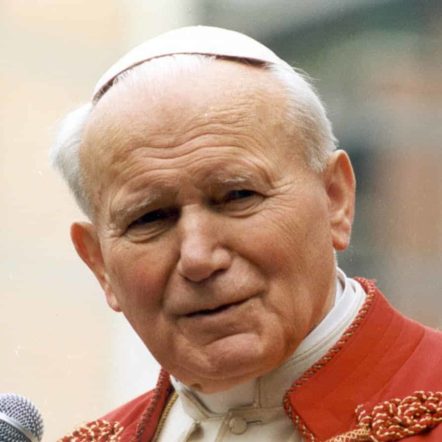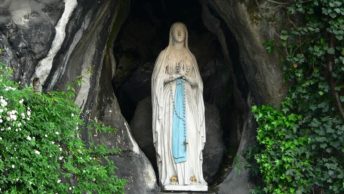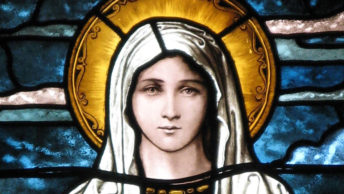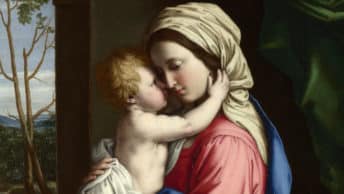Throughout this year we have been celebrating the first centenary from the birth of a great devotee of Mary, Pope St. John Paul II. It would be fruitful to see how this great Marian Pope showed his immense love for Mary, particularly by the way he wrote about her Immaculate Conception in his mariological reflections for this special feast.
To begin with, the Immaculate Conception of Mary evoked in St. John Paul II a Magnificat of praise to God for this creature so imbued with divine love, goodness, beauty and holiness. In his Angelus address for the feast of the Immaculate Conception of Mary, of Monday, 8 December 1997, the saintly Polish Pope said: The background for today’s solemnity is the biblical icon of the Annunciation, when the angel’s mysterious greeting resounded: “Hail, full of grace, the Lord is with you” (Lk 1:28). “Full of grace”! Here is Mary, as God conceived of her and desired her in his inscrutable plan: a creature filled with divine love, all goodness, all beauty, all holiness.
Second, for Pope St. John Paul II the Immaculate Conception of Mary is a powerful sign of a heart totally given to God. Within the same Angelus address he said: “Man looks on the outward appearance, but the Lord looks on the heart” (1 Sm 16:7). And Mary’s heart was fully disposed to the fulfilment of the divine will. This is why the Blessed Virgin is the model of Christian expectation and hope… In her heart there is no shade of selfishness: she desires nothing for herself except God’s glory and human salvation. For her, the very privilege of being preserved from original sin is not a reason to boast, but one for total service to her Son’s redemptive mission.
Third, the feast of the Immaculate Conception of Mary for John Paul II, both personally and ecclesially, meant a life attitude of watchful and prayerful preparation until we meet Christ face-to-face. In his Angelus address of Tuesday, 8 December 1998, the Pope taught us: This important Marian feast occurs during Advent, a season of watchful and prayerful preparation for Christmas. She who knew better than anyone how to wait attentively for the Lord guides us and shows us how to make more vital and active our journey to the Holy Night of Bethlehem. With her, we spend these weeks in prayer and, guided by her bright star, hasten to make the spiritual journey that will lead us to celebrate the mystery of the Incarnation with greater intensity.
Fourth, Mary’s Immaculate Conception is a strong reminder for all of us to cooperate responsibly with God’s loving plan of salvation. In his Angelus address of Sunday, 8 December 1999, Pope John Paul II said: What happened to Mary turns our attention to Jesus Christ, the only Mediator of salvation, and helps us to see life as a loving plan with which we must cooperate responsibly. Mary is not only a model of the call, but also of the response. Indeed, she said “yes” to God at the beginning and at every successive moment of her life, fully complying with his will, even when she found it obscure and hard to accept.
Fifth, Mary’s Immaculate Conception instructs us that humility is the key for the accomplishment of God’s most wonderful salvific plan. In the Angelus of Friday, 8 December 2000, the holy Polish Pope reflected: Today we contemplate the humble girl of Nazareth who, by an extraordinary and ineffable privilege, was preserved from the contagion of original sin and from every fault, so that she could be a worthy dwelling-place for the Incarnate Word. In Mary, the New Eve, Mother of the New Adam, the Father’s original, wondrous plan of love was re-established in an even more wondrous way. Therefore the Church gratefully acclaims: “Through you, immaculate Virgin, the life we had lost was returned to us. You received a child from heaven, and brought forth to the world a Saviour” (Liturgy of the Hours, Memorial of the Blessed Virgin Mary on Saturday, Benedictus Antiphon).
Sixth, Mary’s Immaculate Conception is a privileged and most convincing pointer to the eternally beautiful and fascinating mystery of God. In the Angelus address of Saturday, 8 December 2001, Pope John Paul the Great told us: The Immaculate Virgin however invites us not to fix our eyes on her but to pass beyond, and as much as possible, to enter into the mystery in which she was conceived: the mystery of God who is One and Three, full of grace and fidelity. As the moon shines with the light of the sun, so the immaculate splendour of Mary is totally relative to that of the Redeemer. The Mother leads us to her Son; passing through her, we reach Christ. For this reason, Dante Allighieri notes fittingly: “that her radiance alone can dispose you to see Christ”.
Seventh, Mary’s Immaculate Conception unravels to us that true holiness resides in true docile humility towards God’s will. In the Angelus address on Sunday, 8 December 2002, St. John Paul II teaches us: Mary was pleasing to God because of her docile humility. To the heavenly messenger, she replied, “Behold the handmaid of the Lord, let it be done to me according to your word” (Lk 1,38). It is with the same interior disposition that believers are called to accept the divine will in every circumstance.”
Eighth, Mary’s Immaculate Conception is the example par excellence of the beauty, goodness and the extremely powerful witness of the first-fruits of Christ’s redeeming action. If the first-fruit of Christ’s saving action act is so majestic then one may fathom of what power, majesty and glory Christ’s redeeming action itself is. During the Angelus address on Monday 8 December 2003, Pope Wojtyla said: Today the Church is celebrating the Immaculate Conception of the Blessed Virgin Mary. If Christ is the day that never fades, Mary is its dawn, shining with beauty. Chosen in advance to be the Mother of the incarnate Word, Mary is at the same time the first-fruits of his redeeming action. The grace of Christ the Redeemer acted in her in anticipation, preserving her from original sin and from any contagion of guilt.
Ninth, Mary’s Immaculate Conception helps us believe and hope in God, his salvation as well as in eternal life. In his Angelus address of Wednesday 8 December 2004, Pope St. John Paul II said: The Immaculate Conception shines like a beacon of light for humanity in all the ages. At the beginning of the third millennium, it guides us to believe and hope in God, in his salvation and in eternal life. In particular, it lights the way of the Church, which is committed to the new evangelization.
Tenth, and finally, Mary’s Immaculate Conception powerfully manifests God’s eternal and most particular love for the one He selected to be the Mother of His Son Jesus. The Father’s act was purely a free loving gift of God! Mary’s response, like yours and mine, is that of bearing witness through what she is to this immense gift of the Father to and through her. In his Angelus address of Friday 8 December 1978 Pope St. John Paul II taught us: “Hail, full of grace. What do these words mean? The Evangelist Luke writes that Mary (Miriam), at these words spoken by the Angel, “was greatly troubled…, and considered in her mind what sort of greeting this might be” (Lk 1:29). These words express a singular election. Grace means a particular fullness of creation through which the being, who resembles God, participates in God’s own interior life. Grace means love and the gift of God himself, the completely free gift (“given gratuitously”) in which God entrusts to man his Mystery, giving him, at the same time, the capacity of being able to bear witness to the Mystery, of filling with it his human being, his life, his thoughts, his will and his heart.”
While savouring the priceless mariological reflections which Pope St. John Paul II left to us as a spiritual legacy for the Solemnity of the Immaculate Conception of Mary, let us pray with him this short and heartfelt prayer to Mary Immaculate: We wish, however, to return to our homes with this joyful certainty that you are with us, you, Mary Immaculate, you, chosen for centuries to be Mother of the Redeemer. Be with us. Be with Rome. Be with the Church and with the world. Amen.








